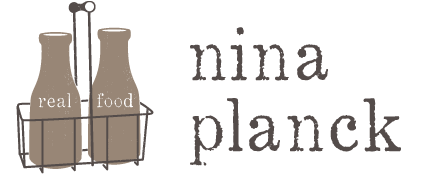Time Out Interview: Nina Planck, author of Real Food for Mother and Baby - A food writer dishes on child nutrition by Nancy Davidson
This interview was published in the Time Out Kids on March 22, 2009.
“It’s nice to be in control of lunch, because most of motherhood you cannot plan for,” Nina Planck says in her new book, Real Food for Mother and Baby (Bloomsbury, $17). She juggles a busy Manhattan work life while sharing the care of her toddler, Julian, with her partner, Rob Kaufelt, owner of Murray’s Cheese. Her experiences growing up on a farm and running urban farmers’ markets, as well as her intensive research on nutrition, inform her philosophy that the best diet for babies consists of breast milk and whole, unprocessed foods. Planck sat down with Time Out Kids recently to share her ideas.
What advice would you give on weaning and first foods?
Introduce real food at six to nine months, with no particular agenda, no goals or milestones. If you can, continue to feed your baby breast milk up to one year or older, because it helps to establish the immune system and smooth out nutritionally uneven periods.
Babies should be able to eat the same food adults are eating. Start with a little egg, meat, fruits and vegetables instead of a bland, starchy diet of rice and other grains. We fed Julian chunks of whatever we were eating—we didn’t stick our spaghetti and meatballs in the blender. Babies are remarkably adept at keeping whole chunks of food at the front of their mouths. Why have teething toys but puree the food? Why not give them a chunk of melon or a pea or a piece of meat?
Many people consider peas and other small bites to be choking hazards.
Of course any parent has to pay attention to make sure the baby doesn’t choke, as you would no matter what he was eating. Julian gnawed on chicken bones as some of his first food.
You express some other potentially controversial opinions in the book, regarding heart disease and red meat and butter.
The science was never convincing when it charged that red meat and saturated fats and cholesterol would give you heart disease. Dietary cholesterol is not the cause of unhealthy blood cholesterol level, and the nutritional and medical establishments are now having to face the real science. So times are changing; eggs have been rehabilitated.
How can families eat healthfully without breaking the bank?
Buy foods in their natural state—whole chickens instead of just breasts. Smaller fish, such as herring, anchovies and sardines, are lower in mercury and less expensive than other fish. If you radically simplify your ingredients, making the same frugal meals over and over again, you can then spend some extra money on the better ingredients. The easiest thing in the world is to buy a whole roasted chicken and have vegetables and a salad. We have meat and two veg pretty much every night.
